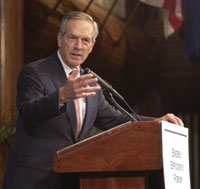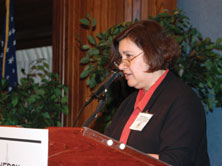
Sponsored by Johnson Controls Inc. and the United States Energy Association (USEA), the theme of this year's forum was "Energy Efficiency: Are We Getting the Job Done?" The presenters stressed that we aren't where we need to be yet regarding efficiency. But they also noted the need for additional energy resources.
The opening featured speaker was Steve Forbes, president and CEO of Forbes Inc. and editor-in-chief of Forbes magazine. The real source of capital, he said, is not physical things. It is metaphysical things, what we make of something. We've made a "glop" called oil an essential thing in our lives.
The topic of energy efficiency is particularly timely right now, he said. "Energy and economic growth are intertwined. They go hand in hand." In terms of economic growth, "We have to do more about energy efficiency. We have to do more about finding energy."

Looking at economic growth, capital expenditures are now growing at double-digit rates, he said. The tax cuts are helping to drive growth. Reducing the capital gains tax helped promote risk. The personal tax cuts also helped fuel growth.
"Equities today are worth $3 trillion more than they were a year ago," said Forbes. The fundamentals are there for continued advancement. We can expect growth rates in excess of 3 percent and probably 4 percent, he remarked.
"We're in a period of enormous economic expansion," Forbes said, both in the United States and around the world. But, he asked, "Will lack of energy end up strangling this growth?"
Part of our energy need is going to be satisfied by energy efficiency, he commented. However, "We have to do more in creating new sources of energy."
One source is coal, which we've become better at burning in a less polluting way, he said. We need to generate more electricity, which means finding more oil and using more nuclear power. We may need to do more offshore oil drilling in an environmentally responsible way, he related. But Forbes made a very strong endorsement for greater use of nuclear power.
"Nuclear is clean and safe," he said. "Nuclear power is the way to go.
"It's extremely unlikely that we'll ever see a serious release from a U.S. nuclear reactor," Forbes declared. There are ways to overcome the fears about nuclear power, he said, and implement it more.
Congressional Update
U.S. Rep. Earl Blumenauer, D-Ore., then presented a congressional update on energy legislation. "It's pretty simple," he said. There has been "18 months with no action," and there will "probably be six more months of no action" with the election coming up.Referring to the Bush administration's National Energy Policy, Blumenauer proclaimed, "It is not an energy policy, but rather a laundry list." Some of its elements may be passed in different bills before Congress, he said.
Looking at energy policy, "It should not be based on energy independence," he stated. "We are not going to drill and dig our way out of this."
Legislators have been working on a wind energy tax credit to promote this energy source, but it is "languishing" in Congress, he said. On the other hand, the nuclear industry has received "massive subsidies," he remarked, but with respect to nuclear power, "We have spent billions of dollars and we haven't gotten it right yet." In contrast to Forbes' support of nuclear energy, Blumenauer said that there are still problems with U.S. nuclear power plants.
He pointed out that, in his state of Oregon, Portland has implemented an energy efficiency policy, and it has reduced the cost of doing business in the city. He believes that energy conservation is not a "personal virtue," as Vice President Dick Cheney once said. "It ought to be incorporated into the way we do business," Blumenauer emphasized.
Energy efficiency should also be incorporated throughout the federal government, which is the largest user of energy, he said. We need to make energy efficiency a political issue and push it in all areas, he concluded.

Innovation And Technology
Next was a panel discussion on "Innovation and Technology," examining the role these factors play in energy efficiency.Richard Fedrizzi, president, CEO, and founding chairman, U.S. Green Building Council, said the green building movement has seen a dramatic increase in the last three or four years. He noted that he was wearing a button that says "Build green and everyone profits."
Green building helps the bottom line, he asserted. The technologies, including HVAC, provide better, more efficient buildings. The council's LEED (Leadership in Energy and Environmental Design) program is substantially expanding, he noted, "96 times faster than standard construction." And he said he's had good collaboration with the federal government's Energy Star program.
One of the biggest fallacies that people have is that a green building costs a lot more, said Fedrizzi. "Some say it costs 20, 30, or 40 percent more to build a green building." He pointed out one recent project where there was less than a 2 percent cost increase. You can also do cost-effective upgrades, he said.
Douglas Faulkner, principal deputy assistant secretary, Energy Efficiency and Renewable Energy, U.S. Department of Energy, outlined the federal role in energy efficiency, explaining that the government is an R&D shop and also a promoter of efficiency. "The president has been a strong promoter of energy efficiency and renewable energy," he stated.
The federal government is now working on such things as solid-state lighting and biomass, and is working on partnerships with the states.
As to the future, Faulkner said, "Over the next five years we'll be on the pathway to the golden age of energy efficiency." It will be a long-term process, he admitted, but we'll be that much closer.
International Initiatives
Speaking on international energy initiatives, U.S. Undersecretary of State for Global Affairs Paula Dobriansky said, "Success does hinge on technological breakthroughs." Cooperation between the public and private sectors underpins our energy efforts and fosters long-term growth.She said that the federal government is working on programs to promote efficiency and sustainable development. And we have taken those initiatives to the international community.
The Commission on Sustainable Development has made energy a primary issue, she stated. The International Partnership for a Hydrogen Economy was launched last November to spur development of fuel cells and a hydrogen infrastructure. "The Partnership is not a large international bureaucracy," she affirmed. It is a forum for sharing best practices.
The Carbon Sequestration Leadership Forum is another major international initiative. It focuses on the capture and isolation of carbon that would normally be emitted when fossil fuels are burned. In these programs, said Dobriansky, "We are working together flexibly and effectively" to move ahead on energy issues.
Free Market vs. Mandate
Another panel discussion covered the topic "Market vs. Mandate: Who's Getting It Done?" Kathleen McGinty, secretary, Pennsylvania Department of Environmental Protection, stated, "We must allow markets to work but also have mandates." She said that Pennsylvania has an array of voluntary programs and they really do work. "Money is saved. The bottom line is enhanced."The state does a lot of work to seek out those who want to participate in its energy efficiency programs. So it does take some effort, said McGinty.
Richard Sandor, chairman and chief executive officer, Chicago Climate Exchange, explained that the Exchange is a voluntary program, but once a company commits, it is legally binding. He said that 30 companies came together to build a consensus and each set targeted reductions in emissions. In 2003, they exceeded their goals. Thus, Sandor believes that mandates can be accomplished through legally binding mutual relationships.

Energy Policy And Growth
Since the Bush administration came into office in 2001, "We've been working very hard to take the right steps for long-term economic growth," stated keynote speaker and U.S. Secretary of Commerce Don Evans. Energy is very important to that growth, he said.We have an economy that depends on "a reliable, available, affordable, and long-term supply of energy," he remarked, and the administration has been working to encourage this.
We need to think about the policies we have regarding energy, said Evans. As soon as he got into office, President Bush put together an Energy Task Force. It produced 105 recommendations, 54 of them regarding efficiency, he noted. The administration committed to a $1.2 billion R&D program on hydrogen technology, which is more efficient and reduces reliance on crude oil. "But we're not finished," he said.
The president continues to wait for an energy bill from Congress. "It's time for the Senate obstructionists to stop playing politics with the energy bill," Evans exclaimed. "The more we delay, the more American consumers will pay in the future and the fewer jobs will be created." We need "a seriousness of purpose" in dealing with energy.
Producing the additional energy that we need will include using coal in an environmentally responsible way, he stated. It will mean building more nuclear power plants. Without available and affordable energy, "it's going to be difficult to meet the challenges in the world." However, he continued, "I'm optimistic that we'll make sure we have a reliable and affordable supply."
As to who's responsible for "getting the job done," as the theme of this forum posed, Evans said, "It's all of us."
Looking at government, the regulatory framework should not get in the way of business, he said. The incentives should be in the right place and rules should be the same for everybody. Also, business needs to be innovative and creative, he remarked. "It's a team effort."
A Look At The Future
Wrapping up the forum, Eileen Claussen, president of the Pew Center on Global Climate Change, spoke about the future of energy. She touched on several key issues to address. The first three, she said, are: (1) energy supply and security; (2) climate change; and (3) cost or price.There must be an adequate and available supply of energy, she stated. We must be environmentally friendly. And energy must be available at a reasonable cost. Basically, she said, "We need a climate-friendly energy policy and an energy-friendly climate policy."
For these first three points, "Energy efficiency is an obvious win-win-win," said Claussen. When we are more energy efficient, we burn fewer barrels of oil. Efficiency is an answer, she related, but it is not the only answer.
Next, we need a wide-ranging portfolio of energy sources and technologies, she maintained. There is no single energy source that will provide a solution. "Is there a silver bullet in the hydrogen economy?" she asked. But, she continued, where does the hydrogen come from? If it comes from coal, we're better off with conventional fuels, she said.
Another key point is that "no individual policy will be sufficient," Claussen stated. We need both targeted climate policy and targeted energy policy. She suggested adopting a cap-and-trade system for emissions and incentives to develop carbon-friendly energy technologies. "We need to build a low-carbon economy," she said.
Finally, she emphasized, "It's going to take a great deal of political will to pull this off." One piece of legislation or one high-profile initiative will not be enough. "We're going to need a sustained commitment to this agenda from our national leaders."
Publication date: 07/12/2004




